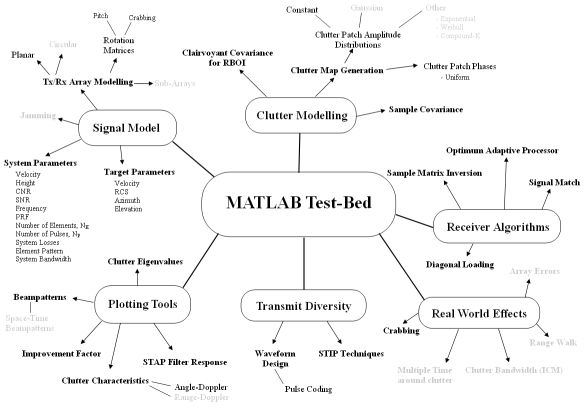SPCOM group

Vacancies: Research Fellow/Post-Doc Positions available, please contact M.Sellathurai@hw.ac.uk if you are interested in PhD studentships and postdoctoral fellowships with the group in the area of signal processing for communications research.
The digital signal processing for intelligent systems and communications (SPCOM) group is involved in a range of research projects at the leading edge of advanced signal processing algorithms, information-theoretic studies, and real world effects with key applications in communications systems, remote sensing and Radar. Broader application areas are also addressed through the team’s involvement in the University Defence Research Centre. This group also strongly linked with University of Edinburgh IDCOM. Industrial collaborators include Bell-Laboratories, Alcatel-Lucent, Defence Science and Technology Lab (DSTL), European Space Agency (ESA) and QinetiQ.
The group is presently funded by EPSRC (EP/M014126/1) Large Scale Antenna Systems Made Practical: Advanced Signal Processing for Compact Deployments [LSAS-SP] and (EP/I037156/1) Physical Layer Network Coding for Wireless Networks (PLAN), Defence Science Technology Lab (DSTL) for Cognitive Radar, UKIERI (British Council) for implementation of cognitive radio and European Union Frame Work 7 Project Advanced Dynamic Spectrum 5G Mobile Networks Employing Licences Shared Access (ADEL) and interference alignment.
Contact: Dr. Mathini Sellathurai
Email: m.sellathurai@hw.ac.uk
Location: EM 3.24, Heriot-Watt University, Edinburgh, EH14 4AS
Strengths of the group lie in the following areas:
- Algorithmic digital signal processing, adaptive and statistical signal processing, Bayesian techniques, random matrix theory, coding theory, compressive sensing, FPGA and architecture
- Cognitive Radio Oriented Wireless Networks and Spectrum Sensing
- Interference Alignment
- MIMO systems, Precoding, massive MIMO, receiver signal processing, ESPAR antennas and analogue beamforming
- Iterative (turbo) detection and decoding
- Cognitive Radar, MIMO radar, waveform design, STAP and array signal processing
- Remote Sensing and compressive sensing
- Satellite Communications and dual-polarized channel characterisation
Completed Projects:
- Ministry of Defence funded: UDRC programme for work on OFDM signal recognition/classification;
- Wireless Fiber Systems to work underwater (sub-sea) communications;
- EPSRC under EP/D07827X/1 for advanced signal processing techniques for multi-user multiple-input multiple-output broadband wireless communications (https://gow.epsrc.ac.uk/NGBOViewGrant.aspx?GrantRef=EP/D07827X/1);
- MIMO-RADAR and waveform agility to improve low elevation target detection (also partially supported by QinetiQ, Portsmouth);
- Huawei technologies: LTE-A MU-MIMO Systems;
- EP/G026092/1 for Bridging the gap between design and implementation of soft-detectors for Turbo-MIMO wireless systems; (https://gow.epsrc.ac.uk/NGBOViewGrant.aspx?GrantRef=EP/G026092/1);
- EP/H012257/1 for Signal Processing Techniques to Reduce the Clutter Competition in Forward Looking Radar; (https://gow.epsrc.ac.uk/NGBOViewGrant.aspx?GrantRef=EP/H012257/1)
- “Cognitive Radio Oriented Wireless Networks (CROWN)”, EU-FP7 – FET-open scheme; Partners: QUB (UK), QinetiQ (UK), Intel Mobile Communications (France), EURECOM (France), Darmstadt University of Technology (Germany) and Athens Information of Technology (Greece); CROWN-233843, EU contribution 2.3 M€ [€488K to QUB], May 2009-April 2012.
Academic Members:
- Dr Mathini Sellathurai
Postdoctoral Fellow and PhD student members
Dr Pat Chambers: Mobile Ad-Hoc Sensor Network (MASNET) along with University of Edinburgh and University Defence Research Centre, funded by Ministry of Defence (MOD) Defence Science Technology Lab (DSTL), £67,219, 2016–2017.
Dr Naveen Mysore Balasubramanya (nm81@hw.ac.uk): A Unified Multiple Access Framework for Next Generation Mobile Networks By Removing Orthogonality (MANGO) project with the University of Edinburgh and Lancaster University. This is an EPSRC funded project (EP/P009549/1) £1.1M lead by HWU, 2017 May –2020 April. Supported Bell-Labs, NJ, USA and Mobile VCE.
Mr Sohail Payami (s.payami@hw.ac.uk): Large Scale Antenna Systems Made Practical: Advanced Signal Processing for Compact Deployments [LSAS-SP] EPSRC–EP/M014126/1, 2015 April -2018 March, £279,512 (£348,000 under FEC) and supported by £200K in-kind support from Bell-Labs, NJ, USA and QinetiQ, UK.
Visiting Fellow/Collaborations
Dr Antony Xavior (NIT Trichy India): FPGA Implementation of Full Duplex Radio, under UK and India Thematic Partnerships 2017April to 2019 March with NITT India. Value: £ 72,470 for HWU.
Dr Rongrong Qian (University of Kunming, Yunnan, China): ESPAR Antenna, beamforming, connected intelligence and networking, and Interference Alignment (EPSRC funded)
PhD Students
• Ms Ní Ms Fióna Mhearáin: Satellite Communications, precoding and dual polarized channel characterizations with European Space Agency
• Mr Seksan Phonsri: Remote sensing and compressive sensing
• Mr Ketpan Watcharapong: Passive Radar using OFDM signals
• Ms Heba Shoukry (hs33@hw.ac.uk):
Mobile Ad-Hoc Sensor Network (MASNET)
(partly funded by DSTL and HWU)
• Mr Daykin Mathew, CDTAP TMVSE- Machine learning of an anatomical atlas for computed tomography medical imaging (funded by EPSRC and Toshiba)
Key information
Mathini Sellathurai
- Professor
- m.sellathurai@hw.ac.uk